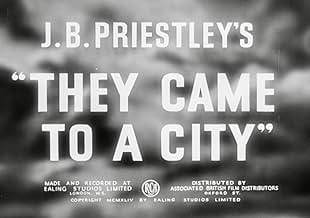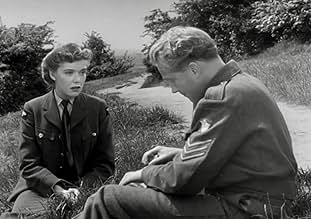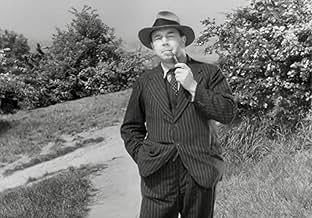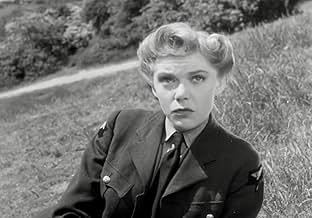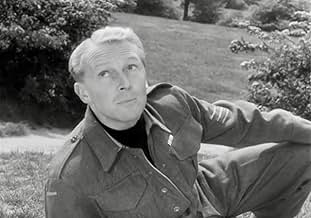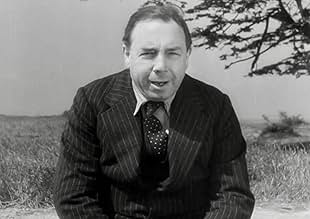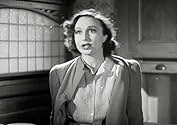Agrega una trama en tu idiomaAdapted from a J.B. Priestley play with many of the original actors. The tale of various people who have come to live in an "ideal" city and their hopes and reasons for doing so.Adapted from a J.B. Priestley play with many of the original actors. The tale of various people who have come to live in an "ideal" city and their hopes and reasons for doing so.Adapted from a J.B. Priestley play with many of the original actors. The tale of various people who have come to live in an "ideal" city and their hopes and reasons for doing so.
- Dirección
- Guionistas
- Elenco
Mabel Terry-Lewis
- Lady Loxfield
- (as Mabel Terry Lewis)
Fanny Rowe
- Philippa Loxfield
- (as Frances Rowe)
Brenda Bruce
- WAAF
- (sin créditos)
Ralph Michael
- Sergeant Jimmy
- (sin créditos)
J.B. Priestley
- J.B. Priestley
- (sin créditos)
Johnnie Schofield
- Bert the Barman
- (sin créditos)
Opiniones destacadas
I usually enjoy malcolmgsw's reviews but this time we have to agree to differ: I consider this, far from being the worst British film, rather amongst the best. Of course, it depends upon what one considers important, how one views our history and the changes in politics. Not long ago, millions of Brits had a vision of a better and more just way of managing things and hopes for a better life for all. This film may have helped the Attlee government gain power the next year, but now all is lost and gone since Clause 4 was thrown out in 1995. The present generation is unhappy but doesn't seem interested in the hopes which this film is concerned with. The acting and the lighting effects are powerful, so it really wouldn't do to sit with one's eyes shut. Of course, if you're hoping for light entertainment and giggles, this film is not for you. It ought to be mentioned that the verse of poetry is taken slightly out of context: 'I dreamed that was the new city of Friends' with a capital 'F', meaning Quakers. It was about the hopes for the founding of Philadelphia in 1681. When a child, Walt Whitman was deeply influenced by a powerful Quaker preacher, and it shows in verses such as this. I can't imagine Whitman would mind his words being applied to this story.
Not exactly highly entertaining but it's not supposed to be entertaining as it's a comparison of posh rich people to poor ones.
Unsurprisingly the rich posh ones are not keen on a society where all are equal so the privileged positions that they currently enjoy would be lost. Eighty years later and nothing has changed as the rich continue to get richer and the poor get poorer.
My favourite character was the washerwoman who held the film together with her comments.
The set must have been very cheap to construct as it seemed to have been made of plywood painter to resemble stone.
Worth a watch but don't expect any excitement like a car chase for example.
Unsurprisingly the rich posh ones are not keen on a society where all are equal so the privileged positions that they currently enjoy would be lost. Eighty years later and nothing has changed as the rich continue to get richer and the poor get poorer.
My favourite character was the washerwoman who held the film together with her comments.
The set must have been very cheap to construct as it seemed to have been made of plywood painter to resemble stone.
Worth a watch but don't expect any excitement like a car chase for example.
A very pleasant surprise. This is an allegory about an imagined socialist paradise, and the judgements that various archetypical citizens would have of it. I Loved it.
It happens that I watched this - on FUBI - on the same night that I watched a documentary about Jane Jacobs, the sociologist of cities and advocate of bottom-up community building. This was a perfect follow up.
It's presented as a series of exchanges between the disparate characters, contrasting their values, experience and social orientation. While it could be criticized as didactic and predictable, I found it well executed and fun. I especially loved Googie Withers as the working class gal whose been around the block a few times but isn't ready to go cynical.
In tone and flavor it's like a blend of Capra with Powell & Pressburger.
It happens that I watched this - on FUBI - on the same night that I watched a documentary about Jane Jacobs, the sociologist of cities and advocate of bottom-up community building. This was a perfect follow up.
It's presented as a series of exchanges between the disparate characters, contrasting their values, experience and social orientation. While it could be criticized as didactic and predictable, I found it well executed and fun. I especially loved Googie Withers as the working class gal whose been around the block a few times but isn't ready to go cynical.
In tone and flavor it's like a blend of Capra with Powell & Pressburger.
The main title actually says 'J. B. Priestley's They Came to a City', and the film constitutes the second of three brief wartime flirtations with fantasy by Ealing Studios.
Coming late in the war when enlightened opinion was already contemplating what was to come next, the ideals it expressed had already found voice in the Boulting Brothers short 'Dawn Guard' and thematically owed a lot to Sutton Vane's 'Outward Bound', James Hilton's 'Lost Horizon' and Priestley's own 1937 fantasy 'I Have Been Here Before'; while the striking production design seems to show the influence of German silent cinema.
Beginning and ending with the genial figure of Mr Priestley ambling on and off, it's not for all tastes, but is certainly quite unlike any other British film before or after.
Coming late in the war when enlightened opinion was already contemplating what was to come next, the ideals it expressed had already found voice in the Boulting Brothers short 'Dawn Guard' and thematically owed a lot to Sutton Vane's 'Outward Bound', James Hilton's 'Lost Horizon' and Priestley's own 1937 fantasy 'I Have Been Here Before'; while the striking production design seems to show the influence of German silent cinema.
Beginning and ending with the genial figure of Mr Priestley ambling on and off, it's not for all tastes, but is certainly quite unlike any other British film before or after.
THEY CAME TO A CITY is based on a play by J.B. Preistley and stars Googie Withers and John Clements. It's sort of an "Outward Bound" story of disparate people who find themselves on a road that leads to a monolithic waiting room before a giant door. While waiting, each person explains his/her life, hopes, gripes, etc. When the door finally opens they descend in "the city." We never see it. As they emerge from the city, some are struck by the new social order, happiness of the people, the freedom, etc. while others are repelled by what they see. This utopia seems based on socialist views.
Coming toward the end of WWII, the story is framed by a couple sitting by a roadside overlooking a manufacturing city. They are arguing about what kind of world will emerge after the war. Will things be different. A man wanders by (J.B. Priestley himself) and he joins in, telling the story of his utopia.
Those who hate "the city" include a selfish dowager who browbeats her mousy daughter, a man of the landed gentry who lives on inherited money, a ruthless industrialist who makes money in order to make more money, and a jealous wife who hates anyone to has the things she wants. Those who like the city include the mousy daughter, an old charwoman, the henpecked husband, the world-weary barmaid (Withers), and the stoker (Clements) who has searched the world for a paradise.
While not very cinematic, the overall idea is quite interesting, and the actors (mostly from the stage play) are quite good. Besides Withers and Clements, the film co-stars Raymond Huntley and Renee Gadd as the Strittons, Ada Reeve as the charwoman, Mabel Terry-Lewis and Frances Rowe as the dowager and daughter, A.E. Matthews as the industrialist, Norman Shelley as the landed gentry.
Coming toward the end of WWII, the story is framed by a couple sitting by a roadside overlooking a manufacturing city. They are arguing about what kind of world will emerge after the war. Will things be different. A man wanders by (J.B. Priestley himself) and he joins in, telling the story of his utopia.
Those who hate "the city" include a selfish dowager who browbeats her mousy daughter, a man of the landed gentry who lives on inherited money, a ruthless industrialist who makes money in order to make more money, and a jealous wife who hates anyone to has the things she wants. Those who like the city include the mousy daughter, an old charwoman, the henpecked husband, the world-weary barmaid (Withers), and the stoker (Clements) who has searched the world for a paradise.
While not very cinematic, the overall idea is quite interesting, and the actors (mostly from the stage play) are quite good. Besides Withers and Clements, the film co-stars Raymond Huntley and Renee Gadd as the Strittons, Ada Reeve as the charwoman, Mabel Terry-Lewis and Frances Rowe as the dowager and daughter, A.E. Matthews as the industrialist, Norman Shelley as the landed gentry.
¿Sabías que…?
- TriviaFinal film of Mabel Terry-Lewis.
- Citas
Alice Foster: I never thought there *could* be a place as good as this.
- ConexionesFeatured in Sosialismi (2014)
- Bandas sonorasMusic selected from The Divine Poem
Music by Aleksandr Skryabin (as Scriabin)
Played by The London Philharmonic Orchestra
Conducted by Ernest Irving
Selecciones populares
Inicia sesión para calificar y agrega a la lista de videos para obtener recomendaciones personalizadas
Detalles
- Tiempo de ejecución1 hora 18 minutos
- Color
- Relación de aspecto
- 1.37 : 1
Contribuir a esta página
Sugiere una edición o agrega el contenido que falta

Principales brechas de datos
By what name was They Came to a City (1944) officially released in India in English?
Responda
